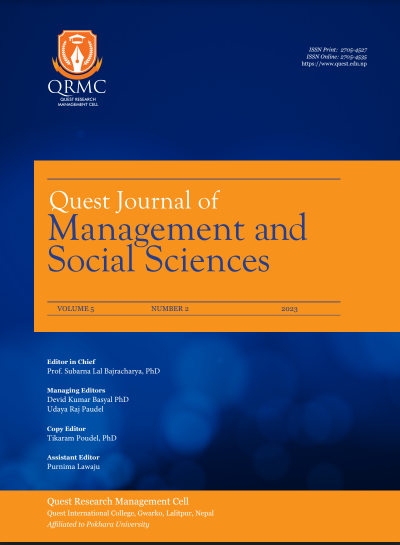Emotional Intelligence and Work-Life Balance of Female Staff in Commercial Banks in Kathmandu District
DOI:
https://doi.org/10.3126/qjmss.v5i2.60830Keywords:
Female employees, Emotional intelligence, Work-life balance, Commercial banksAbstract
Background: Women's participation in the workforce is expanding all around the world. Nepali women are actively participating in both household and financial activities. When compared to their male counterparts, Nepalese women suffer from work overload.
Objective: This paper investigates the impact of emotional intelligence on work-life balance among female employees in commercial banks in Kathmandu.
Design/methodology/approach: This research is quantitative in nature and deductive in approach. It followed a cross-sectional survey based on judgmental sampling. SPSS was used to analyse the data collected from 399 usable questionnaires returned from respondents.
Finding: The result showed that self-awareness, self-management, self-motivation, empathy and social skills had a significant positive impact on work-life balance.
Conclusion: Emotional intelligence (EI) enables people to be self-aware, self-regulate, manage a peer-to-peer relationship, motivate themselves and communicate more effectively and accurately to accomplish the given task. Employees who feel more in control of their lives are better equipped to balance work and family. Today, organisations need to take various measures to develop EI in their employees to renew themselves and continuously achieve a harmonious work-life balance.
Downloads
Downloads
Published
How to Cite
Issue
Section
License
Copyright (c) 2023 Quest Journal of Management and Social Sciences

This work is licensed under a Creative Commons Attribution-NonCommercial-NoDerivatives 4.0 International License.
This license enables reusers to copy and distribute the material in any medium or format in unadapted form only, for noncommercial purposes only, and only so long as attribution is given to the creator.




